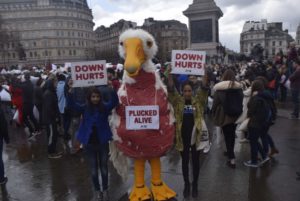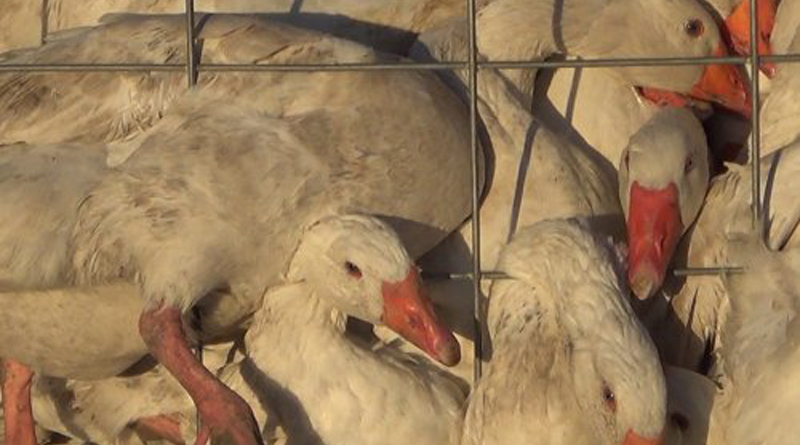CRUELTY OF DOWN PRODUCTION
Most people who care about animals would never dream of wearing fur, but if the jacket in your wardrobe, the duvet on your bed, or even the pillow you lay your head on is filled with feathers, it could also be a product of animal suffering. The down industry is built on cruelty – and the people who profit from it would rather keep the truth hidden.
Geese and ducks are outgoing, social animals who live in large gaggles and flocks. Geese mate for life, raise their young together, and grieve when their partners die. Ducks preen themselves regularly, flaunt their beautiful plumage for potential mates, and, like geese, are fiercely protective of their offspring.
Designers and manufacturers covet these birds’ down – the soft layer of feathers closest to their skin. To obtain it, workers pin them down as they struggle and scream by stepping on their necks and delicate wings, tightly bind their feet, and yank their feathers out so violently that their skin often tears open, leaving them with bloody, gaping wounds, which are hurriedly stitched together with a needle and thread – and no painkillers.

This barbaric process, called “live plucking”, begins when the birds are barely 10 weeks old and continues every six weeks until they’re slaughtered – long before they would have died naturally.
That’s the cruelty that the down industry wants to keep secret. But the truth is coming to light. Investigations by People for the Ethical Treatment of Animals (PETA) US and its Asian affiliate have exposed this industry for what it is: barbaric.
Eyewitnesses visited farms across China, which supplies 80% of the down used around the world for clothing and bedding, and saw workers stand on the necks of terrified geese or put them in chokeholds as they ripped out their feathers and swung them around by the wings.
After they’d been plucked bare, the geese who weren’t paralysed by fear cried out in pain and tried to flee from their tormentors. Others didn’t survive: on some farms, geese and ducks were left to die slowly and in agony – eyewitnesses found their decaying bodies in crates or ponds, where they’d been tossed aside like rubbish.
A single goose has just 60 grams of micro-feathers and down at any one time. One farm admitted to producing 15 tonnes of live-plucked down annually – that’s 250,000 live pluckings.
Caring consumers would never knowingly purchase anything that involved such cruelty. But they can easily be misled by certifications, such as the Responsible Down Standard or the Non Live-Plucked Products Guarantee, which are used in a disingenuous attempt to reassure consumers that the feathers in a parka or pillow weren’t torn out of geese and ducks while they were still alive.
These certifications are no guarantee at all. During their investigations, eyewitnesses with PETA US and PETA Asia spoke with down-industry representatives who deal with these professed “responsible” suppliers, and the buyers made no secret of buying and selling live-plucked down. One even bragged about misleading consumers.
Their deception creates a murky international supply chain that purposely leaves consumers in the dark – there’s simply no way of knowing with any certainty whether a down sleeping bag or duvet has been stuffed with live-plucked feathers.
As a result, purchasing any product made with down supports the live-plucked down industry and, in turn, condemns ducks and geese to a lifetime of suffering that ends in a painful, premature death.
Before they’re slaughtered and their feathers are sold, geese and ducks spend their lives crowded inside cramped cages or dark, filthy barns, where they’re denied everything that’s natural and important to them – they can’t fly, swim, forage, or, in many cases, even turn around. And the environmental impact of the down industry is devastating: 1,000 geese can produce over 450 tonnes of waste a year. Some factory farms hold as many as 20,000 geese.
Purchasing down could also support the foie gras industry, a notoriously abusive operation in which a metal tube is painfully forced down the throats of geese and ducks several times a day so that their stomachs can be pumped full of corn mush, until their livers finally swell to up to 10 times their normal size. Foie gras producers bloat their bank accounts further by selling the feathers of abused birds.
The only way to ensure that no ducks or geese suffer for our clothing or bedding is to avoid buying any product that uses down.
That’s why PETA – whose motto reads, in part, that “animals are not ours to wear” – is encouraging shoppers to make kind choices. We’ve held a series of demonstrations, including gate-crashing a massive pillow fight in Trafalgar Square with a giant plucked “goose” holding a sign reading, “Down Hurts”. We also enlisted the support of Made in Chelsea star Lucy Watson, who opted for animal-friendly bedding after seeing our down-industry exposé. And on our website, we share steps that people can take to urge companies to stop using down.
At the same time, we’re meeting behind the scenes with dozens of major corporations across all industries to persuade them to end the use of down. The response continues to be encouraging.
After PETA’s exposé revealed that even “responsible” down may be linked to suppliers that live-pluck birds, an array of brands suddenly saw the down industry for what it is and chose to distance themselves from it. Topshop, White Stuff, Cath Kidston, Hobbs, Primark, Warehouse, and many others have made the compassionate decision to keep down out of their future collections.
Besides the cruelty inherent in its production, there are also practical reasons for not using down. Not only is it expensive, it’s also useless when it gets wet. On the other hand, natural and synthetic animal-free fillers – such as Flocus and PrimaLoft® – will keep you warm in all weather, cost less, are allergen-free, and don’t collect dust and get mouldy like down does.
Down production should leave all kind people cold. Please, keep it out of your wardrobe.
ABOUT THE AUTHOR
Yvonne Taylor Is Director of Corporate Projects at People for the Ethical Treatment of Animals (PETA.org.uk).

